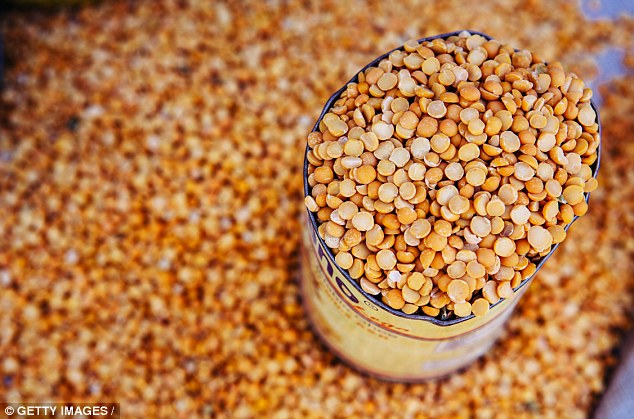![36C79E8000000578-3718326-image-a-15_1470063008420[1]](https://www.how-to-vegan.com/wp-content/uploads/2017/03/36C79E8000000578-3718326-image-a-15_14700630084201.jpg)
Swapping meat and eggs for lentils and nuts could add years to your life, a major new study suggests. Scientists found eating less protein from animal sources such as red meat and dairy products, and increasing plant proteins from cereals, beans and soya, substantially reduced death rates. Mortality from heart disease fell 12 per cent, and deaths from all causes fell by 10 per cent, for every three per cent increase in calories from plant protein, the researchers found. In contrast, raising the animal protein share of calories by 10 per cent led to an eight per cent greater chance of dying from a heart problem and two per cent higher risk of all-cause death.
For every three per cent increase in calories from plant protein, mortality from heart disease fell 12 per cent, and deaths from all causes fell by 10 per cent
The scientists, from Massachusetts General Hospital, based their findings on health and diet records gathered from 131,342 people, who were tracked for three decades.
Replacing processed red meat with vegetables, nuts and cereals saw the biggest drop in death rates, of 32 per cent.
Substituting eggs for plant protein led to a 19 per cent reduction in death risk, and swapping out unprocessed red meat saw a 12 per cent drop.
Animal protein foods include all types of meat, fish, eggs and dairy products such as milk and cheese.
Plant sources of protein include cereals, beans, nuts, legumes, soya and bread.
Lead scientist Dr Mingyang Song said: ‘Overall, our findings support the importance of the sources of dietary protein for long-term health outcomes.
‘While previous studies have primarily focused on the overall amount of protein intake – which is important – from a broad dietary perspective, the particular foods people consume to get protein are equally important.
‘Our findings suggest people should consider eating more plant proteins than animal proteins, and when they do choose among sources of animal protein, fish and chicken are probably better choices.’
The research, published in the journal JAMA Internal Medicine, found the link between animal protein was highest among people who were obese, had a history of smoking, drank heavily, and who did little exercise.
Among the healthiest participants, the link disappeared – which the researchers said was probably because health-conscious people were already eating more fish and poultry rather than red and processed meat.

+4
Substituting eggs for plant protein led to a 19 per cent reduction in death risk, scientists from the Massachusetts General Hospital found
Different food sources have different kinds of protein, with animal proteins thought to have a marked effect on the body’s metabolism, increasing cardiovascular disease and other illnesses.
Plant proteins, in comparison, are known to reduce blood pressure and cholesterol and increase the sensitivity of insulin.
But the scientists said the main health benefit of swapping one type for another, is animal sources of protein come with other unhealthy elements.
Processed red meat, for example, tends to be packed with salt and fat, whereas nuts are full of beneficial omega-3 fatty acids.
The authors wrote: ‘Other components in protein-rich foods, eg. sodium and nitrates in processed red meat, in addition to protein per se, may have a critical health effect.’

Animal protein foods include meat, fish, eggs and dairy products such as milk and cheese
Professor Tim Key, director of Oxford University’s Cancer Epidemiology Unit, said: ‘Few previous studies have specifically addressed the relationships of mortality with animal vs plant protein.
‘Previous long-term studies on major animal and plant foods are broadly consistent with these findings, and there are several mechanisms which could explain the findings.
‘Overall, the study adds to the view healthy diets should emphasise plant foods, including plant sources of protein, and intakes of animal source foods – especially processed meat – should be low.’
Dr Ian Johnson, from the Institute of Food Research in Norwich, said: ‘This interesting and robust work seems to support the growing consensus diets based largely on plant foods are better for long term health than diets containing large quantities of meat and dairy products, but it tells us little about mechanism.
‘It is far from clear whether plant proteins are protective or animal proteins are detrimental to health, or whether these protein levels are simply markers for something else.’

Plant proteins, such as ones found in lentils, are known to reduce blood pressure and cholesterol and increase the sensitivity of insulin
Dr Gunter Kuhnle, of the University of Reading, added: ‘The overall results of the study show an overall healthy lifestyle, including – but not limited to – a healthy diet is beneficial.’
Victoria Taylor, senior dietitian at the British Heart Foundation, said: ‘While this study reported benefits to people consuming more protein from vegetable sources, it doesn’t mean we need to avoid animal proteins entirely.
‘A portion of oily fish a week, for example, is a helpful addition to a healthy diet.
‘If meat-free meals seem like a step too far at the moment, then simply substituting some of the meat we eat for protein from plants – things like beans or lentils – can help to stretch out the amount of meat or fish we eat and include more of these nutritious ingredients in our diets.’
Comments
comments
